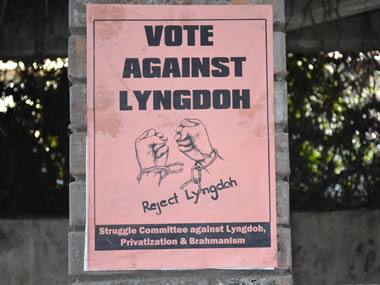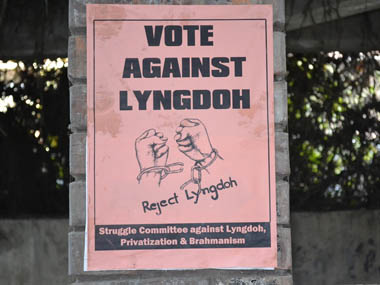New Delhi: Nowhere else does James Micheal Lyngdoh have as many opponents, as in Delhi’s Jawaharlal Nehru University (JNU). “Vote Against Lyngdoh,” say posters on the red walls of the university, in which students’ elections were conducted on Thursday. “We oppose the Lyngdoh committee recommendations in total. There is only one option as far as students’ elections in JNU are concerned- elections without any outside interference,” says Banojyotsna, member of the struggle committee against Lyngdoh, Privatisation and Brahminism, which has put up the posters. The argument of the ‘struggle committee’ is that by conducting the current JNU students’ union (JNUSU) elections as per relaxed Lyngdoh recommendations, students leaders have surrendered before the government. [caption id=“attachment_232696” align=“alignleft” width=“380” caption=“Posters on the walls of the university say ‘Vote Against Lyngdoh’. Danish Raza/Firstpost”]
 [/caption] Though the committee has boycotted the students’ elections, it is supporting Javed Iqbal Wani, an independent candidate fighting for the post of president. In October 2008, three days before JNU was to witness students’ elections, the Supreme Court banned the exercise as it was found violating Lyngdoh committee recommendations for students’ elections, issued in 2006. The All India Students Association (AISA), on behalf of the University General Body Meeting, filed a PIL in the apex court demanding a stay on the ban. The Court did not stay the guidelines, but relaxed the same for JNUSU election. The Lyngdoh committee recommendation says that no research scholar above 28 years can contest elections. It has been relaxed to 30 years for JNUSU polls. Photo copied material was distributed during campaigning in JNU when the recommendations do not allow circulation for any printed material. Lyngdoh recommendations bar a student from contesting polls if he has faced any disciplinary action against him. For JNUSU election, however, a student cannot fight an election only if he has a charge sheet against him. Sandeep Singh, national president of AISA, says “This not the ideal situation in which students’ elections is conducted in JNU. But we have accepted the relaxed recommendation so that the university can at least have elections. This does not mean succumbing to pressure. We will form a national platform against the crackdown happening on the name of Lyngdoh recommendations.” Students’ elections as per relaxed Lyngdoh norms are also seen by some, as a way of transferring power from students bodies to the university’s administration. Roshan Kishore, Delhi president of Student Federation of India (SFI), says, “It will be a long to way before we conduct elections in a traditional JNU fashion.” Unlike students’ elections in other universities in which Akhil Bhartiya Vidtarthi Parishad (student wing of BJP) and National Students Union of India(student wing Congress) remain in the forefront, JNUSU elections is considered a straight fight between SFI, student wing of CPI (M) and AISA, affiliated to CPIML (liberation). Ten candidates are in the race for president, vice- president, general secretary and joint secretary. The results of JNUSU elections are expected to be announced by Saturday afternoon. The selected body will be dissolved in October when the university will again witness students’ elections. Therefore, the current elections are seen as interim arrangement.
[/caption] Though the committee has boycotted the students’ elections, it is supporting Javed Iqbal Wani, an independent candidate fighting for the post of president. In October 2008, three days before JNU was to witness students’ elections, the Supreme Court banned the exercise as it was found violating Lyngdoh committee recommendations for students’ elections, issued in 2006. The All India Students Association (AISA), on behalf of the University General Body Meeting, filed a PIL in the apex court demanding a stay on the ban. The Court did not stay the guidelines, but relaxed the same for JNUSU election. The Lyngdoh committee recommendation says that no research scholar above 28 years can contest elections. It has been relaxed to 30 years for JNUSU polls. Photo copied material was distributed during campaigning in JNU when the recommendations do not allow circulation for any printed material. Lyngdoh recommendations bar a student from contesting polls if he has faced any disciplinary action against him. For JNUSU election, however, a student cannot fight an election only if he has a charge sheet against him. Sandeep Singh, national president of AISA, says “This not the ideal situation in which students’ elections is conducted in JNU. But we have accepted the relaxed recommendation so that the university can at least have elections. This does not mean succumbing to pressure. We will form a national platform against the crackdown happening on the name of Lyngdoh recommendations.” Students’ elections as per relaxed Lyngdoh norms are also seen by some, as a way of transferring power from students bodies to the university’s administration. Roshan Kishore, Delhi president of Student Federation of India (SFI), says, “It will be a long to way before we conduct elections in a traditional JNU fashion.” Unlike students’ elections in other universities in which Akhil Bhartiya Vidtarthi Parishad (student wing of BJP) and National Students Union of India(student wing Congress) remain in the forefront, JNUSU elections is considered a straight fight between SFI, student wing of CPI (M) and AISA, affiliated to CPIML (liberation). Ten candidates are in the race for president, vice- president, general secretary and joint secretary. The results of JNUSU elections are expected to be announced by Saturday afternoon. The selected body will be dissolved in October when the university will again witness students’ elections. Therefore, the current elections are seen as interim arrangement.
In JNU, students try to retain power
Danish
• March 3, 2012, 13:33:58 IST
The argument of the ‘struggle committee’ is that by conducting the current JNU students’ union (JNUSU) elections as per relaxed Lyngdoh recommendations, students leaders have surrendered before the government.
Advertisement
)
End of Article